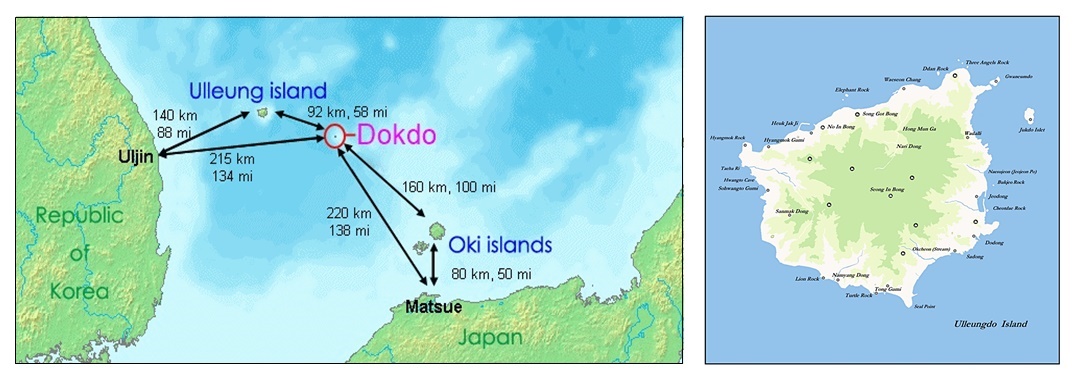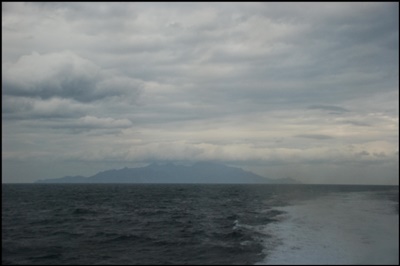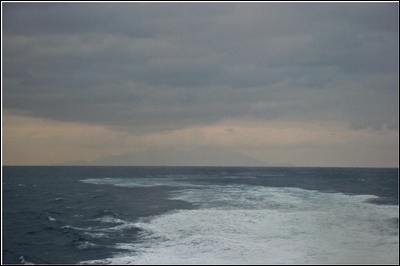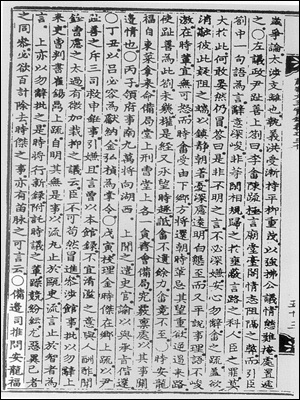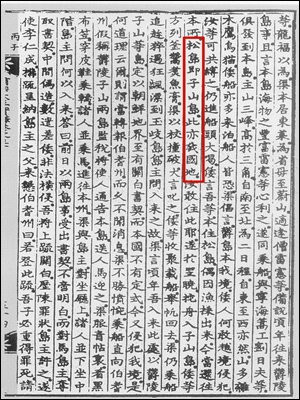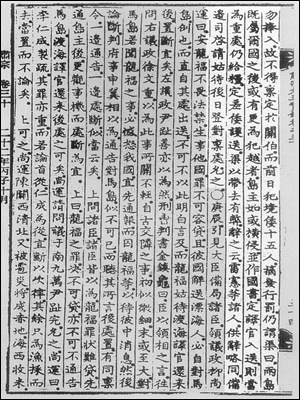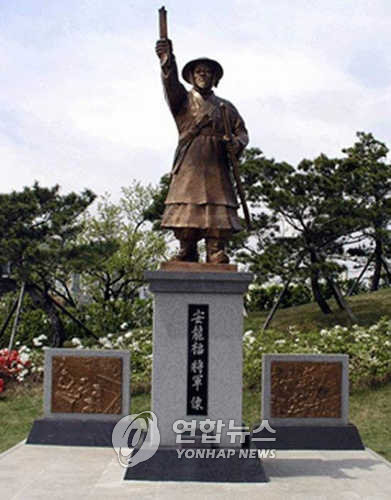 An Yong-bok, who lived in Dongnae, Busan, during the reign of Joseon’s King Sukjong, traveled to Japan twice, in 1693 and 1696, and played a pivotal role in making the Japanese Shogunate government officially recognize Ulleungdo and Dokdo as Joseon territory. In his youth, An Yong-bok joined the navy and served as an oarsman on a ship charged with protecting coastal areas from the raiding Japanese marauders known as Waegu. He became fluent in Japanese while living in Busan, as he frequented Waegwan, the settlement for Japanese merchants in Joseon.
An Yong-bok, who lived in Dongnae, Busan, during the reign of Joseon’s King Sukjong, traveled to Japan twice, in 1693 and 1696, and played a pivotal role in making the Japanese Shogunate government officially recognize Ulleungdo and Dokdo as Joseon territory. In his youth, An Yong-bok joined the navy and served as an oarsman on a ship charged with protecting coastal areas from the raiding Japanese marauders known as Waegu. He became fluent in Japanese while living in Busan, as he frequented Waegwan, the settlement for Japanese merchants in Joseon.
The first An Yong-bok incident described on this page occurred in the spring of 1693 about 40 Korean fishermen from Busan and Ulsan clashed with the Otani and Murakawa fishermen at Ulleung-do. An Yong-bok, and Pak Eo-dun, (박어둔) were captured and taken to the Yonago in the Tottri clan (modern-day Yonago city and Tottori Prefecture).
To the right a stutue in Busan, Korea honors An Yong Bok who twice accompanied Korean citizens to Japan in protest of Japanese trespassing into Ulleungdo and Dokdo. To this day, An Yong Bok’s activities remain a strong expression of Korean sovereignty over Dokdo and Ulleungdo dispite Japanese lobbyists attempts to disregard this valuable historical data.
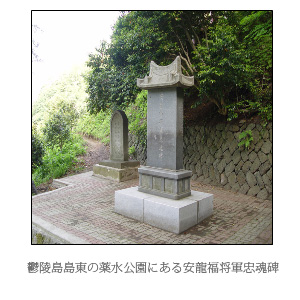 During the early 15th century, Joseon had enacted a resettlement policy under which it relocated Ulleungdo residents to other areas to protect them from ongoing Waegu (Japanese Pirate) raids. Japanese fishermen were known to have been fishing off the coast of Ulleungdo since the early 17th century, taking advantage of the absence of people living on the island at that time.
During the early 15th century, Joseon had enacted a resettlement policy under which it relocated Ulleungdo residents to other areas to protect them from ongoing Waegu (Japanese Pirate) raids. Japanese fishermen were known to have been fishing off the coast of Ulleungdo since the early 17th century, taking advantage of the absence of people living on the island at that time.
To the left, a monument on Korea’s Ulleungdo Island honors the bravery of An Yong Bok. Treated unfairly by his own government, in hindsight, Koreans now realize he was a hero for having the courage to defend Chosun territory. Without the activities of An Yong Bok, it’s quite probable both Ulleungdo and Dokdo would be Japanese islands to this day.
An Yong-bok protested to the Shogunate government through the magistrate of Hokishu that Ullungdo (Takeshima) was Choson’s territory, and the magistrate had to ask the Shogunate government for instruction on An’ s case. The Shogunate issued an instruction to bring An and Pak to Nagasaki, where Tsushima authorities took them over and repatriated them to Choson, accompanied by two Tsushima emissaries, Tachibana Saneshige and Tadayo Saemon, in December 1693. These emissaries came not just to return the ordinary drifters, but brought with them an official letter addressed to the Vice Minister of Rites.
The official letter brought by the Tsushima envoys in behalf of the Shogunate government ma assertions as if Takeshima existed on the East Sea as an island different from Ullungdo and Korean fishing activities at Takeshima (Ulleungdo) would be considered illegal. Thus, it eventual claimed Ulleungdo as belonging to Japan which had the fishing rights there. After receiving this letter, the Choson government discussed possible counteractions. But, having experienced a ravaging war with Japan, Korea was concerned about a possible clash with Japan and decided to write a Japan stating that Ullungdo was a Korean territory, but fishing by Koreans would be banned off Takeshima.
“..Our country has been strict on voyages abroad and forbidden fishermen from going out to the ocean. Even voyages to our territory of Ullungdo are not permitted as it is too far. How would they be allowed to go outside of our boundary? We are grateful for your gesture of good neighborliness in taking trouble of returning the boat which had ventured into your territory of Takeshima. The fishermen are making a living by fishing and could suffer hardship of drifting by storms. But their act of crossing over the and penetrating deeper will be duly punished by law. Punishment will be meted out to these criminals by law now. …”
At first, Tachibana hesitated to go to Choson because he knew the “Soron” faction was in power and Nam Ku-man advocated a hard-line policy on Japan and recommended King Sukchong not make a concession on Ullungdo to Japan. Meanwhile, the Choson government reached the conclusion that the Japanese demand to delete the words “our territory of Ullungdo” was aimed at eventual occupation of the island and recommended King Sukchong to punish the Japanese taking a voyage to Ullungdo.
Besides, a proposal to set up a garrison on Ullungdo was discussed for fear that regions of Kangnung and Samch’ok would suffer if Japan occupied Ullungdo. Jang Han-sang was made associate commander Samch’ok and sent to Ullungdo to prepare for a garrison setup. ( See Jang Han Sang’s Ulleungdo Report Here ) The center of the discussions were Nam Ku-man and Yun Chi-wan who belonged to the “Soron” faction and took a hardline policy on Japan rather than a policy of appeasement. The negotiations for revision of the Choson’s reply had not been as smooth as Tachibana had predicted.
“Ullung is located in the middle of the sea east of Uljin, and the seaway is inconvenient due to the danger of heavy seas. Therefore, the inhabitants have been withdrawn and the island is now vacant, but officials are often dispatched there for search. The mountains and rivers are meandering, and the topography is irregular, becoming wide and narrow. The records about the relics of habitation and local staple products are all written down in the Yoji Sungnam, and they are also put down in the chronicles of successive generations. Fishermen of our country went to that island, they met unexpectedly your countrymen who had trespassed on our boundary arbitrarily they clashed with one another.
Two Koreans were seized perversely and taken to Edo, but fortunately thanks to the kind consideration of Your Honor they have been repatriated, for which we are grateful. It is off the shore and on Ullungdo in our country where fishing logging were done. As bamboo is grown there, the island is also called Takeshima (Bamboo Island), and the names are different, they refer to the same island. The fact that it is the same island with two different names is recorded in the books of our country , and people of your province are fully aware of it. Isn’t the morality sincerity and trust breached when you have not taken up the misc duct of trespassing on our boundary and, arresting Choson people, while claiming Takeshima as your territory in the letter and trying to have Choson ban fishing boats? It is hoped that this matter be reported to the Shogunate government and that your people on the coastal areas be warned not to cause any further incident by sailing Ullungdo…”
The lord of Tsushima, So Yoshitsugu, however, rejected Choson’s reply for fear of reprimand by the Shogunate government Protocol officer Yu Chip-il and the interpreter who had came down from Hansong (Seoul) to Tongnae to meet the Japanese envoy had to return as they were unable to fulfil the order of the court to hal the reply to the envoy and entertain him.As Tachibana had expected, on the expurgation of the words from the first letter the negotiations had not been resolved until the next year in June 1695, due to the hardline policy of Choson. So, Tsushima decided to send a renowned theoretician in Kyushu, Suyama Akira (Suyan Shouemon), together with Tachibana, to negotiate the revision of the note. Suyama submitted a note to the Tongnae magistrate asking why Choson was refusing to revise the letter and requested the note be forwarded to the court in May 1695. However, Choson continued rebutting it by citing the old books which showed that Ullungdo had belonged to Choson since the vacant island policy was implemented 82 years before in 1614.
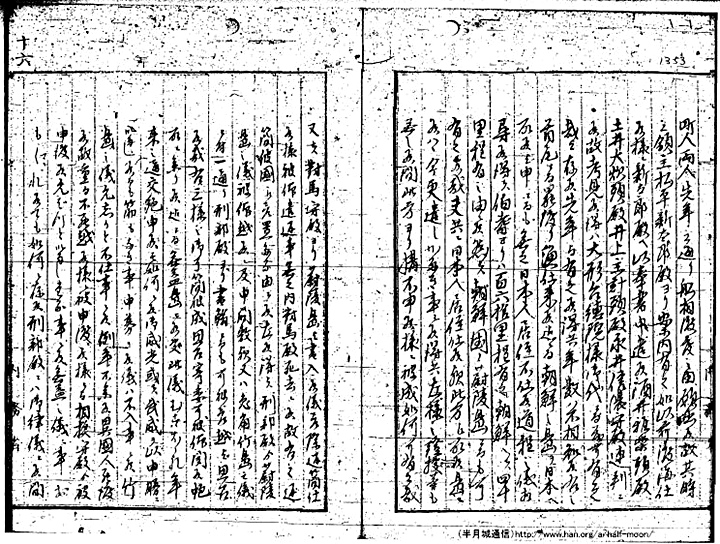 The following record could be said to be one of the most critical pieces of data in the Dokdo Takeshima dispute. Although this letter makes no mention that Dokdo was ceded to Korea, when cited with related records such as the Tottori – Bafuku Records it’s clear Japan gave up Dokdo (then Matsushima-松島) as well. ( link to Tottori Bafuku Records )
The following record could be said to be one of the most critical pieces of data in the Dokdo Takeshima dispute. Although this letter makes no mention that Dokdo was ceded to Korea, when cited with related records such as the Tottori – Bafuku Records it’s clear Japan gave up Dokdo (then Matsushima-松島) as well. ( link to Tottori Bafuku Records )
As we read further, the Shogunate government finally sent to Hokishu and Tsushima an official letter in the name of the Roju in January 1696.
The official letter contained the following instructions:
“..Takeshima is said to belong to Inbashu, but the Japanese people have never lived there. At the time of Itokukun, Tokugawa Iemitsu the third Shogun, the merchants of Yonagomura wanted to go there for fishing, and permission was given. Geographically, the island located at 160 ri (640 kms) from Inbashu, whereas it is only about 40 ri (160 kms) from Choson. Therefore, it is undoubtedly Choson’s territory. The country could settle the matter by military power, but is not our policy to impair the good-neighborly relations over a us less, small island. From the beginning, that island was never taken from Choson by force, and it does not make sense [for Choson] to turn it over to us. The only thing to do is to prohibit permanently the Japanese people from going there for fishing. Therefore, this should be communicated to Choson. …”
However, an unexpected incident occurred in the summer o 1696. As the dispute on Ullungdo was not settled down promptly due to Tsushima’s refusal to accept the letter, An Yong-bok decided to personally resolve the problem of the Japanese trespassing and fishing at Ullungdo. A group of 11 Koreans led by An Yong-bok went to Inbashu (present Tottori prefecture) and Hokishu (Tottori prefecture) via Ullungdo and Tokdo (Matsushima), and appealed directly to the Shogunate government that Ullungdo (Takeshima) and Tokdo (Matsushima) were Choson’s territory. This took place when An Yong-bok gathered his fishermen and went to Ullungdo in the spring of 1696 and found some Japanese fishing boats moored at the island.
Then An Yong-bok and his party went directly to Inbashu via Oki and protested against the Japanese voyage to Ullung and Usan They falsely told Inbashu authorities that they were tax inspector: for Ullung-Usan. They forged a government note of protest and asked Inbashu authorities to transmit it to the Shogunate government so that illegal Japanese crossing to Ullungdo could be banned. A Choson record states that Inbashu authorities pledged to punish those trespassing on Ullungdo and Tokdo and any usurpation by the lord of Tsushima over the question, if and when the Choson government brought such a case or cases to the attention of Japan in an official note.
“…I live in Dong-nae and I went to see my mother in Ulsan. While there I happened to meet Chung-noe-heon and others and told them about my travels to Ulleungdo. I also told them the island is rich in marine products and they thought it profitable. After we all got together with boatman Yu-il-bu living in Yeonghae and arrived at the island. The three-peaked mountains were higher than Samgak Mountains. It took two days to get from the North to the South and as many from East to West. There were a lot of trees, hawks, crows and cats. There were also a number of Japanese ships anchoring there and seamen were afraid. So I came forward and said, “When Ulleungdo belongs to Chosun how dare you Japanese people invade our territory? I’ll have to arrest all of you” And I came to the front of the boat and continued scolding them loudly. Then one of them said “We live in Songdo (松島) and came out here fishing by chance….Now we are going back to our places….” So I said “Your calling Songdo is Jasando (Usando-于山島)and that is also our territory. How dare you live there….?”
Early in the next morning I sailed for Jasando (Japanese name Songdo/Matsushima) and when I got there these Japanese people were stewing some meat oil in large iron pot. I picked up a large piece of wood and hit and broke the pot with it while shouting at them. They started packing their belongings in a boat and sailed off. So, I got in my boat and followed them, however I suddenly met with a storm and drifted to Oki Island. There the chief of the islands asked me why I was there. I answered “When I came here only a few years ago, it was determined that Ulleungdo and Jasando are Chosun’s territory, and even an official letter (which was meant to prevent Japanese nationals from fishing these areas) was made by GwanBaek. Still this country has no proper manners and has broken into our territory again. What kind of misconduct is this?
To this, he replied that he would certainly send the message to Baekgiju (district), but no word came for a long time. So I got in my boat and sailed to Baekgiju right away in a rage. I was going to introduce myself as a tax inspector for both Ulleungdo and Jasando and have a person notify the main island. But then I was met with some people and horses sent by the main island.
So we headed for the village with me riding a man-pulled carriage in a blue official uniform, a black hat and leather shoes and the rest of them riding horses. After we arrived, the ruler of the islands and I sat in the main hall facing each other and some others on a lower level floor. The ruler asked, “What brought you here?” and I said, “It is a clear fact that regarding those two islands an official letter was made, but Daemado Island Chief took the letter away, altered the content and sent it away a couple of times and by crossing into our territory broke our agreement. So I am going to report this to the proper authorities and inform them of these illegal activities…”
Upon hearing this, the ruler acknowleged. Finally Mr Lee In-Seong was going to make a report on this incident to be read by the king but Daemado’s ruler’s father Baekgiju. “If the letter is sent up to the king my son will get severlely punished and won’t escape the death penalty. So please don’t send the letter..” Due to his begging the letter didn’t get sent to Baekgiju office. But those fifteen Japanese people who had crossed into Chosun territory were found and punished accordingly. He continued to talk to me, “Those two islands already belong to your country. Therefore if anyone or ruler breaks into Chosun territory make sovereign messages and send an official translator with them to Japan. Then severe punishments will certainly be metted out to those offenders….”
Upon saying this, he was going to send some people along to guard us but I rejected saying I didn’t want to impose any inconveniences. Statements by Chung-noe-heon and many others told the same story.
An official from Bibyeonsa Department said to the King, “Please let me tell you more about this on our next meeting..”
To this the King agreed…..
Tsushima did not want the question of Ullungdo to become further complicated or to lose its lucrative position as intermedia between Korea and Japan. To that end, Tsushima negotiated with the Shogunate not only to persuade An Yong-bok to withdraw his letter delivered through Inbashu, but also to repatriate the Koreans by treating them as castaways. Consequently, the territorial dispute over Ullungdo and Tokdo raised by An Yong-bok and his party was withdrawn, and they were repatriated to Choson as drifters. When Pyon Tong-ji and Song P’an-sa were sent to Tsushima after the settlement, the lord informed them of the Shogunate decision on the Ulleungdo affair, but lodged a protest against An Yong-bok’s contact with Inbashu and demanded Choson not to deal with any local authorities of Japan but Tsushima.
Although the Japanese government’s decision was already made in 1696, Choson learned about it belatedly from the report of the mission by the two envoys who returned from Tsushima in 1697 and also from the communication of the Tongnae magistrate.
By the mid-19th century, the Japanese began to write as if Takeshima (Ullungdo and Tokdo) were originally Japanese territory but ceded to Choson. The response Tsushima submitted to an inquiry made by the Shogunate government when the smuggling at Ullungdo became an issue in 1837 maintained that since Japan “ceded” Takeshima (Ullungdo) to Choson in 1696, the voyage to that island was prohibited. This statement could raise a misunderstanding that Takeshima was originally a Japanese island but was ceded to Choson and might have distorted the Shogunate government’s knowledge of Ullungdo and Tokdo. This perception finally degenerated into the idea that the cession of Takeshima (Ullung and Tokdo) to Choson was a mistaken decision by the Shogun. government.
Before the uncovering of Japanese records of the incident in 2005 some Japanese historians argued that the Jasando Anyongbok refered to must have been Ulleungdo’s neighbor island Jukdo but this interpretation doesn’t make sense for a couple reasons. First Jukdo Islet is about 2kms away from Ulleungdo, if indeed these Japanese were trespassing there Anyeongbok would have no need to wait until early the next day to venture when they were ten minutes rowing distance away. Secondly, Jukdo Islet is about 100 meters high of sheer cliffs with no fresh water or sufficent mooring for boats and is quite treacherous. With some of Ulleungdo’s best mooring to be found so close it is not reasonabl to conclude the Japanese would scale this wall to set up camp.
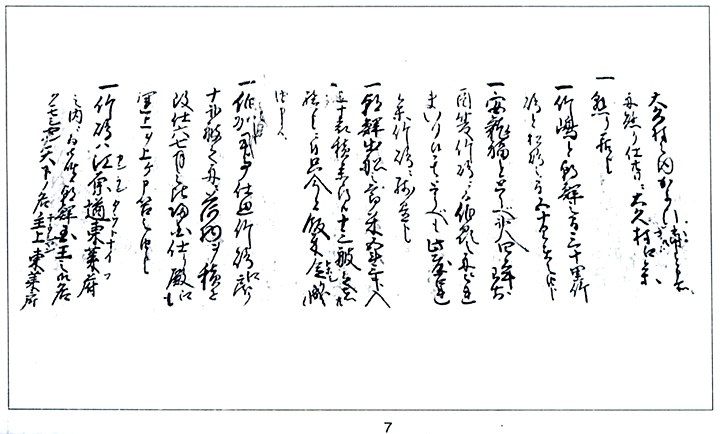 To collaborate with these facts, in 2005 documents uncovered in the historical archives of the Murakawa family in Shimane Prefecture more facts were revealed about the events that transpired in 1696. These documents are somewhat more detailed and reveal a couple of facts for the first time. When Anyongbok sailed to Oki Islands he prepared a text map of Gangwan Province that included both Jukdo (Ulleungdo) and Songdo (Dokdo). In addition the distance from Ulleungdo and Dokdo was given as 50 ri. This is of course much too far to be Jukdo Islet that is only 2kms away from Ulleungdo.
To collaborate with these facts, in 2005 documents uncovered in the historical archives of the Murakawa family in Shimane Prefecture more facts were revealed about the events that transpired in 1696. These documents are somewhat more detailed and reveal a couple of facts for the first time. When Anyongbok sailed to Oki Islands he prepared a text map of Gangwan Province that included both Jukdo (Ulleungdo) and Songdo (Dokdo). In addition the distance from Ulleungdo and Dokdo was given as 50 ri. This is of course much too far to be Jukdo Islet that is only 2kms away from Ulleungdo.
The document to the right was from the 2005, Murakawa Records where Anyongbok himself stated that Jasando (Dokdo) was around 50 ri from Ulleungdo. This is much too far to be any other island than Dokdo.
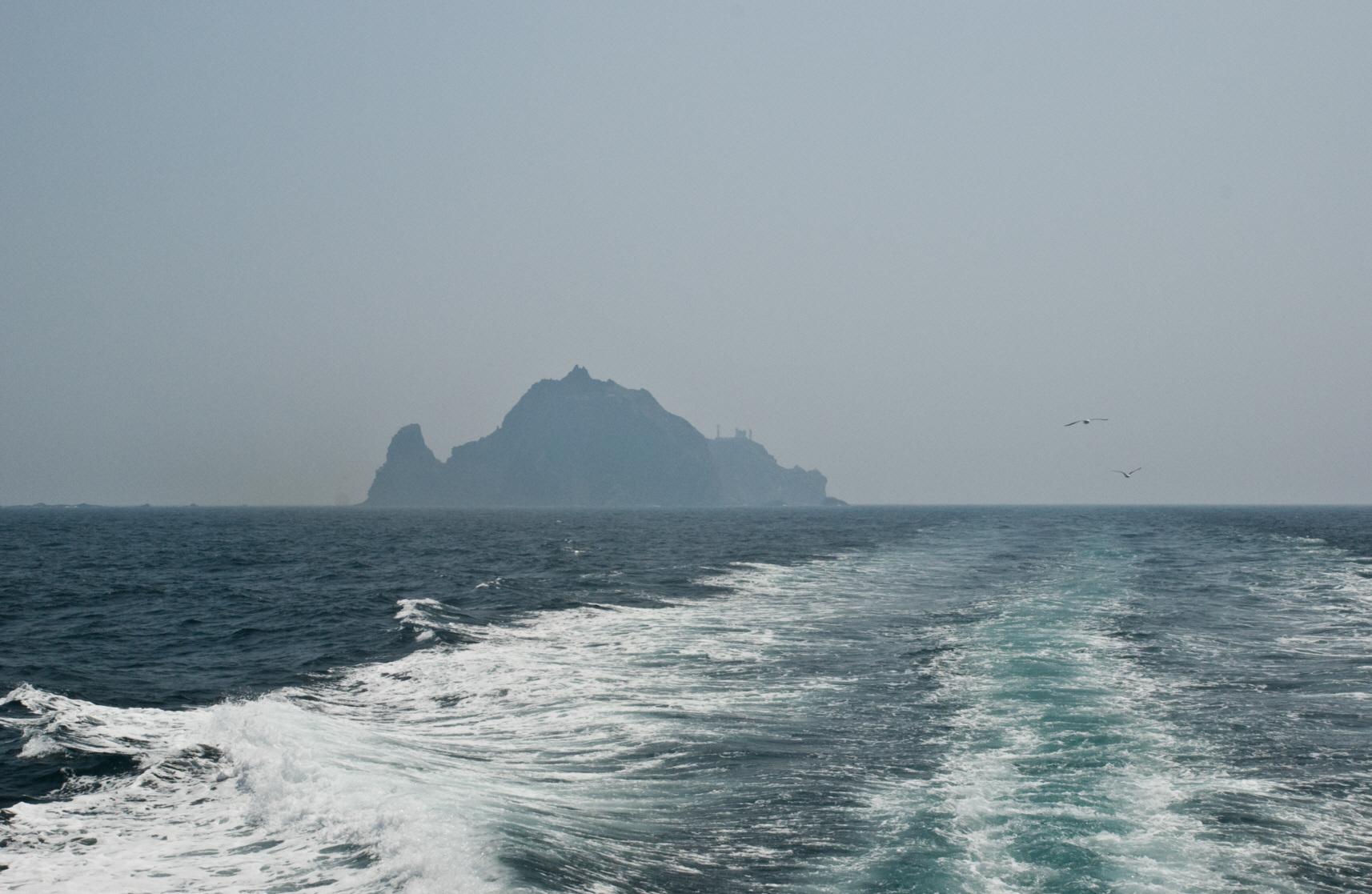 Some Japanese contend that this dispute did not include Dokdo along with Ulleungdo and thus the Japanese were not forbidden to voyage to Dokdo. When one considers the utility of Dokdo to the Japanese it becomes clear why these tiny rocks were not much of an issue.
Some Japanese contend that this dispute did not include Dokdo along with Ulleungdo and thus the Japanese were not forbidden to voyage to Dokdo. When one considers the utility of Dokdo to the Japanese it becomes clear why these tiny rocks were not much of an issue.
To the left is picture of Dokdo Island taken from the West, looking East on a hazy summer day. An Yong Bok’s voyages to Japan’s Oki Islands would have placed him easily within visual distance of Dokdo Island.
For all purposes, Ulleungdo was the big prize in this conflict. To “cede” this island to Chosun was a great loss to Japan at the time. With the loss of Ulleungdo the Japanese no longer had reason to covet Dokdo as they only used these rocks as a stopover when fishing in Ulleungdo. There are no historical records or maps that separate Ulleungdo from Dokdo.

